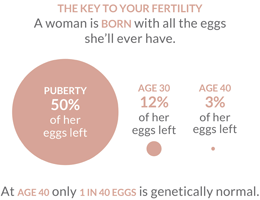Is egg freezing right for you?

Women are feeling and looking younger than ever. But no matter how good we look and feel for our age, 40 is not the new 30 when it comes to fertility. Recent studies have shown that many women have no idea how quickly their fertility begins to decline after age 35.
So, if you are in your 30’s and not ready to start a family yet you might want to consider a procedure called social egg freezing. Social egg freezing is the term commonly used for the process of freezing eggs for future use. Significant improvement in a technique called vitrification—where the egg is frozen very quickly to a low temperature- has dramatically improved the success of the procedure.
As women, we are born with all the eggs we will ever have. We start losing eggs the minute we are born, and this loss is significant by our late thirties. However, not only does your egg quantity decline but your eggs quality decline as well. Poor egg quality leads to a higher rate of infertility, more frequent miscarriages, and a greater risk for chromosomal disorders in the offspring.
Egg freezing involves the same process as IVF (in vitro fertilization) where you inject medication to stimulate the ovaries to grow multiple eggs. Eggs are then removed from the body with a needle (that goes through the vagina into the ovaries), with the eggs being flash- frozen for later use.
1) When should you freeze your eggs?
The short answer is sooner rather than later. You will never have better quality eggs than you have at this moment. We recommend that women freeze their eggs before the age of 38 if possible. Egg freezing after the age of 38 has a lower success rate and that rate plummets after the age of 42.
2) Who should freeze her eggs?
In an ideal world, single women and couples would try to conceive in their 20s and early 30s, but we know that more and more women are having children in their late 30s and 40s when their biological clocks are running out. If you are not in a position to have a child right now, freezing eggs or embryos are options to consider.
Egg freezing is the best option if you don’t currently have a partner and you want your future child to be the biological offspring of your future partner.
If you are in a relationship, however, you might want to consider fertilizing your eggs with your partner’s sperm and then freezing the embryos. If you feel strongly about having a larger family, you should consider the difficulty of pregnancy in your later years, when trying for baby number 2 or 3. Most women starting their families after the age of 35 years, have on average 1-2 children. Having frozen eggs or embryos may allow you the option of having more children later on.
3) How long do frozen eggs last?
Once eggs are frozen, they can remain stored for years. When a woman wishes to use her frozen eggs, they are thawed, fertilized with sperm to make embryos, and the embryos are put into her uterus to achieve a pregnancy.
4) How successful is egg freezing?
The pregnancy rate per embryo transfer is between 20 to 40 percent, depending on the age at the time of freezing.
Freezing your eggs or embryos does not guarantee that a healthy pregnancy will occur, so do not put all your eggs in the frozen basket! Plan to start your family sooner than later.
5) How much does it cost?
The treatment costs $7800 plus the cost of medications, which is typically $2000 to $3000. Once eggs or embryos are stored, there is a $200 to $400 annual storage free. No part of the treatment is covered by the B.C. Provincial Health Plan, but some private insurance companies will cover part or all the treatment.
To learn more about your fertility and whether egg or embryo freezing are good options for you, talk to a fertility specialist who can help assess your current and future fertility. There really is no time like the present.
Dr Tallon is co-director at Olive Fertility Centre. She is also a Clinical Assistant Professor at UBC. Dr Tallon has a special interest in egg freezing and has co-authored a published guideline on fertility preservation.
About Olive Fertility Centre
Located in Vancouver, BC, Olive Fertility Centre is one of Western Canada’s largest IVF and prenatal diagnosis centres. With an advanced IVF lab, and innovative programs that include specialized genetic testing, egg freezing, and prenatal NIPT testing, Olive Fertility (olivefertility.com) provides comprehensive fertility care to infertile couples, single women, and same-sex couples.









